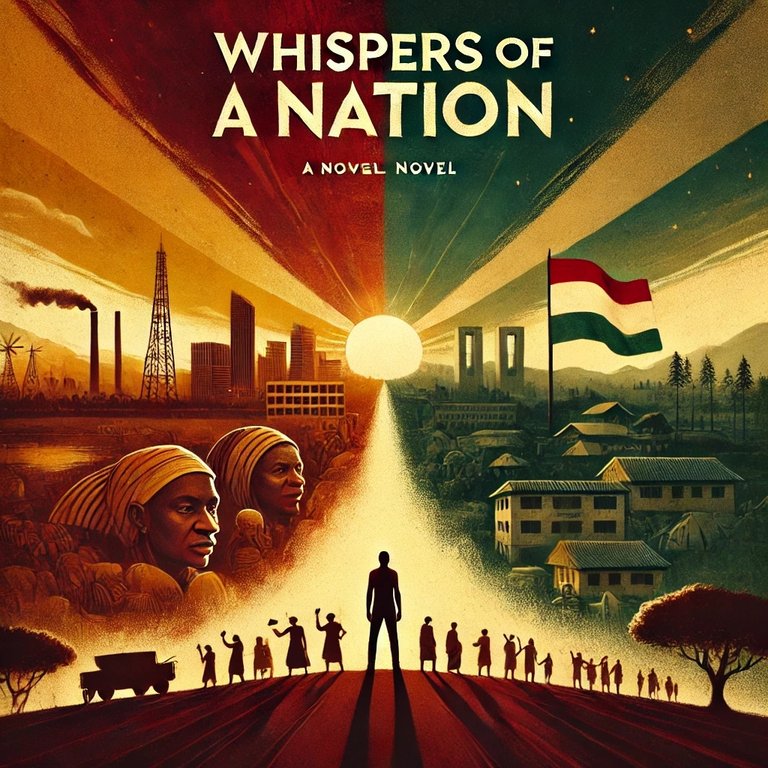The skies over the village were thick with smoke, the sun casting an eerie glow through the ashen clouds. Ngozi stood at the edge of the marketplace, her heart heavy with the burden of all that had been lost. The fires that had raged through the night left the village scorched, and the once-bustling square now resembled a graveyard. Stalls that had once overflowed with life—fresh fruits, fabrics, and the echo of laughter—were now smouldering ruins.
She could still hear the screams in her head, the distant cries of mothers and children fleeing in every direction. But in the aftermath of the chaos, what remained was a deafening silence, like the calm after a storm, but with an ominous weight.
Ngozi’s mind wandered back to the conversations she’d had in the days leading up to this disaster. She had overheard the whispers, the cautious exchanges about the growing unrest. But it was as though no one wanted to believe the fire could spread to their village, to their homes. Yet here they stood, with nothing left but the ashes of what once was.
Suleiman appeared from behind one of the charred structures, his deep-set eyes filled with sorrow but also with the quiet strength that had become his hallmark. His tattered cap was still on his head, and despite the soot that clung to his clothes, he seemed untouched by the chaos, at least on the outside.
 AI-generated image.
AI-generated image.
“Ngozi,” he called softly, his voice cutting through the haze.
She turned, her face worn and tired. “Suleiman… How did it come to this?” Her voice cracked, betraying the tears she had been holding back.
He shook his head slowly, walking toward her. “The fire was just the beginning. The real battle is what comes next. Rebuilding... after all of this.” His hand swept over the ruins, the devastation so complete it seemed impossible to imagine this place once held life.
“I don’t know if we can,” she replied, her gaze following his hand. “There’s nothing left.”
Suleiman sighed, wiping the sweat and ash from his brow. “There is always something left. We are still standing.”
Before Ngozi could respond, a figure emerged from the distance—Aisha, with her determined gait, as always. But this time, her usual defiance was tempered by the weight of what she had witnessed. She had seen the flames from her home, barely escaping with the children under her care.
Aisha approached them, her voice quieter than usual. “They’re saying it was sabotage, that someone set the fires on purpose.”
Ngozi's eyes widened. “Who would do such a thing?”
“There are rumours,” Aisha continued, “that it was done to silence us, to scatter the protests, to make sure we are too broken to rise again. But I don't know if I believe it. It doesn’t matter anymore, though, does it? The damage is done.”
Suleiman’s jaw clenched as he listened. “They think they can break us with fire? We’ve survived worse.”
Aisha nodded. “But survival is not enough anymore, Suleiman. We can’t just survive. We have to live.”
For a moment, the three stood in silence, absorbing the weight of Aisha’s words. Survival had become the bare minimum, a daily battle. But to live—to truly live—was a dream that felt farther and farther away with each passing day.
Ngozi wiped a tear from her cheek. “We can't let this be the end. There are still people here, people who need us. If we give up now, everything we’ve fought for will be lost.”
Suleiman stepped closer, placing a reassuring hand on her shoulder. “Then we rebuild. We begin again, brick by brick, even if we have to lay them ourselves.”
A small smile tugged at the corner of Ngozi’s mouth. “And where do we start?”
“With the children,” Aisha said firmly, her voice gaining strength. “We start with them. They are the future. If they see us rebuilding, if they see that we haven’t given up, they won’t either.”
Suleiman nodded. “The school may be gone, but learning doesn’t stop because there are no walls. We teach them in the open, under the trees, if we have to.”
The resolve in his voice reminded Ngozi of why she had always admired him. He was a man who saw hope even in the darkest times, who believed that the future was worth fighting for, no matter how bleak the present seemed.
A distant rumble interrupted their thoughts. At first, they all tensed, fearing more violence, but as the sound grew louder, they recognized it. A convoy of trucks carrying aid from a nearby town was making its way toward them.
“They’re here,” Ngozi said, her heart lifting slightly.
Suleiman exhaled, a rare smile breaking across his face. “It’s a start.”
As the trucks rolled in, bringing supplies—food, medicine, and tools for rebuilding—the villagers began to emerge from their homes, cautious but hopeful. The fire had taken much, but it hadn’t taken everything. It hadn’t taken their spirit.
Ngozi, Suleiman, and Aisha moved toward the trucks, ready to help distribute the aid. But as they did, Ngozi looked out at the horizon. There, beyond the smoke and the wreckage, she saw the sun breaking through the clouds, casting a warm, golden light over the village.
It was a small sign, but it was enough to remind her that even in the worst of times, the dawn still came.
And with it, the whispers of a nation continued to stir—whispers of resilience, strength, and a future worth fighting for.
End of Chapter Sixteen.